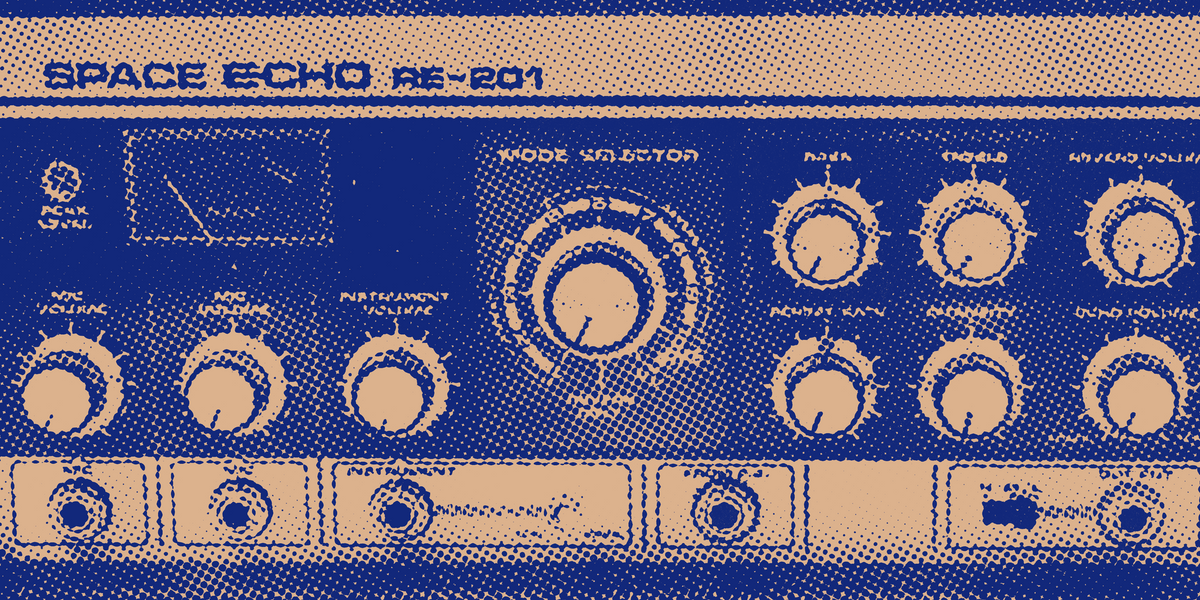The Roland Space Echo is a timeless classic (when it works)
Unstable but magical, the Roland Space Echo holds a special place in studio history, even if it is slowly being consigned to being a museum piece. This is its story.

The Roland Space Echo, first introduced in the 1970s, is a tape echo machine, a device that uses magnetic tape to create echo and reverb effects. But to simply label it as such would be an understatement. The Space Echo is a testament to the beauty of analog sound, a machine that creates warm, organic echoes that have a unique character and depth that digital delay units often struggle to replicate.
The Space Echo works by recording an incoming audio signal onto a loop of magnetic tape. This tape then passes over several playback heads before being wound back up. The speed at which the tape is played back, along with the distance between the record and playback heads, determines the delay time and the character of the echo. The result is a rich, complex echo effect that can add depth and texture to any audio signal.
The Creation Story
The Space Echo was the brainchild of Ikutaro Kakehashi, the founder of Roland Corporation. Kakehashi was a visionary who believed in the power of music and the potential of technology to unlock new sonic possibilities. He set out to create a device that could replicate the complex echo effects found in professional recording studios, but in a portable and affordable format that would be accessible to a wider range of musicians and producers.
The design process was a monumental task. The team had to contend with a host of technical challenges, from dealing with tape wear and unreliable motors to achieving consistent echo effects. But Kakehashi and his team were undeterred. Through a process of relentless experimentation, meticulous refinement, and sheer determination, they were able to overcome these obstacles.
The result was a machine that was not only reliable and durable but also capable of producing a wide range of echo and reverb effects. It was a machine that was ahead of its time, a testament to the ingenuity and vision of its creators. The Space Echo was more than just a product; it was a revolution in sound design, a machine that would change the face of music production forever.
Famous Users and Songs
The Roland Space Echo has been embraced by a diverse range of artists across various genres, each drawn to its unique sonic capabilities. From the psychedelic rock of Pink Floyd to the dub reggae of King Tubby, the Space Echo has found a home in the studios of many iconic musicians, adding its distinctive touch to some of the most influential records of the past half-century.
One of the most famous uses of the Space Echo can be heard on David Bowie's "Heroes". Producer Tony Visconti used the Space Echo to create the song's distinctive guitar sound, which echoes and swirls around Bowie's vocals. The result is a sonic landscape that is as haunting as it is beautiful, a testament to the creative possibilities of the Space Echo. Reggae and dub pioneer King Tubby is another notable user of the Space Echo. His innovative use of the device helped to define the sound of dub music, with its heavy use of echo and reverb. The Space Echo was a key component of Tubby's "sound system", and its distinctive sound can be heard on countless dub tracks from the 1970s and beyond.
Maintenance and Care
While the Space Echo is a robust and reliable machine, it does require regular maintenance to keep it running smoothly. The magnetic tape needs to be replaced periodically to prevent degradation of the echo effect, and the various mechanical parts need to be cleaned and lubricated to ensure reliable operation.
However, maintaining a Space Echo can be a labor of love. The machine's unique sound and character make it worth the effort, and many users find the process of caring for their Space Echo to be a rewarding part of the creative process. It's not just about keeping the machine running; it's about preserving a piece of music history, a tangible link to the golden age of analog sound.
Cultural Impact
The Roland Space Echo has had a profound impact on the music industry. Its distinctive sound can be heard on countless records, and it has inspired a whole generation of musicians and producers. But its influence extends beyond the confines of the recording studio. It's hard to imagine the genres stemming from Reggae and Dub's use of tape delay and spring echo without the Space Echo, such is the key role it had in the hands of the likes of Lee "Scratch" Perry and King Tubby (give or take some other iconic reverbs and delays in their own right).
The Space Echo has also had a significant cultural impact. It has become a symbol of the analog era, a time when music production was a tactile and physical process. The Space Echo represents a link to this past, a reminder of the craftsmanship and creativity that went into creating the music of the era.
Moreover, the Space Echo has become a cultural icon in its own right. Its distinctive look, with its large knobs and meters, and its unmistakable sound, have made it a favorite among music enthusiasts and collectors. It's not just a piece of equipment; it's a piece of music history. Which makes it only more ironic that
Roland, the company that refuses to do an accurate analog re-issue of the Space Echo or Juno or Jupiter or 909 and 808 or 303 or (okay you get the point), citing that they "don't chase ghosts", continues to churn out digital recreations. It's a quirk of what is an iconic, if at times wayward, music technology company, but hopefully not an immutable stance. For example, the limited edition re-release of the ARP 2600 or Korg's own MS-20 could serve as inspiration for Roland to prop up it's brand with the goodwill of genuine recreations, rather than nostalgic remixes.
Modern Emulations and Recreations
In recent years, there has been a resurgence of interest in the Space Echo, and many companies have released digital emulations and hardware recreations of the iconic machine. These modern versions aim to capture the unique sound and character of the Space Echo, while also offering the convenience and reliability of modern technology.
Companies like Universal Audio and Soundtoys have released digital plugins that emulate the sound of the Space Echo, allowing producers to add its distinctive echo and reverb effects to their tracks without the need for the original hardware. Meanwhile, companies like Boss and Strymon have released hardware units that recreate the Space Echo in a more compact and reliable format.
While these emulations can never fully replicate the magic of the original Space Echo, they do offer a viable alternative for those who want to incorporate the Space Echo's distinctive sound into their music. They are a testament to the enduring appeal of the Space Echo, and a reminder of its lasting impact on the world of music production.
From here into the future
The Roland Space Echo is more than just a piece of music equipment. It's a piece of music history, and as long as you can keep it up and running, it's a usable and unique addition to the studio. And in some ways has become something a prop for the modern working studio. But one well worth keeping in check and occasionally immersing into the magioc of playing on.


